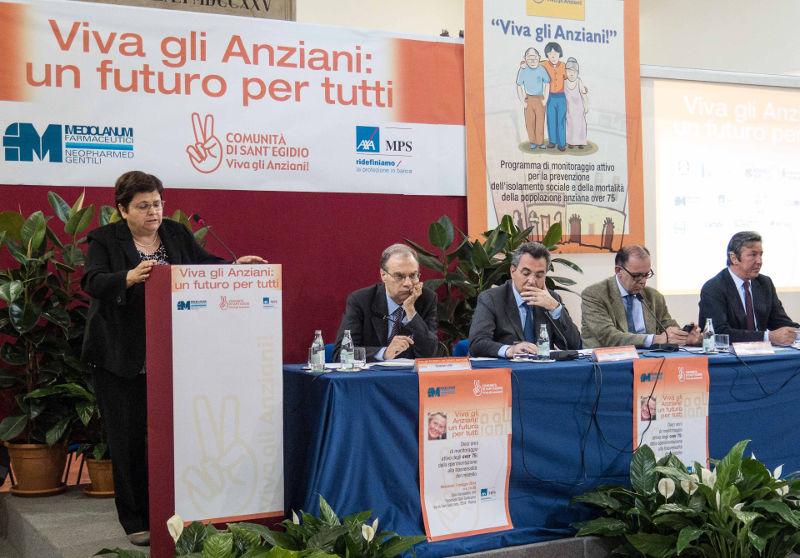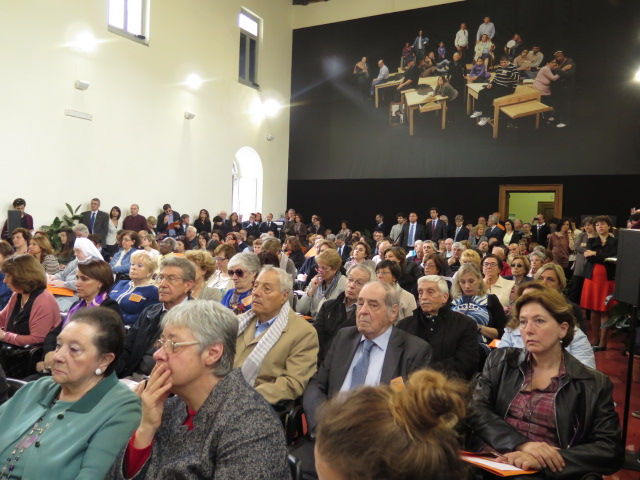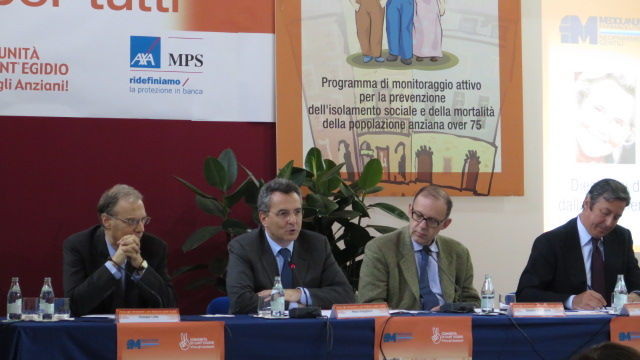 “An extremely far-sighted initiative; a model that suits them and that must be expanded; a complex dimension that must be generalized; a philosophy based on the principle of subsidiarity, which aims to break the loneliness of people". Last but not least, a programme that requires "a reduced use of resources, with significant savings for the NHS that is now facing a problem of sustainability" due to the economic crisis and the demographic trends. Thus Minister of Health Beatrice Lorenzin praised the programme “Long live the elderly" developed for ten years in three districts of the historic centre of Rome by the Community of Sant'Egidio, through its network of volunteers, neighborhood operators, proximity services. A programme, said president of Sant'Egidio Marco Impagliazzo that gives "a true answer to the problems of today, because it breaks the isolation of the elderly by setting up a network of solidarity that helps to create a new culture that Italy needs to overcome the crisis, and that activates unexpected mechanisms of emulation". “An extremely far-sighted initiative; a model that suits them and that must be expanded; a complex dimension that must be generalized; a philosophy based on the principle of subsidiarity, which aims to break the loneliness of people". Last but not least, a programme that requires "a reduced use of resources, with significant savings for the NHS that is now facing a problem of sustainability" due to the economic crisis and the demographic trends. Thus Minister of Health Beatrice Lorenzin praised the programme “Long live the elderly" developed for ten years in three districts of the historic centre of Rome by the Community of Sant'Egidio, through its network of volunteers, neighborhood operators, proximity services. A programme, said president of Sant'Egidio Marco Impagliazzo that gives "a true answer to the problems of today, because it breaks the isolation of the elderly by setting up a network of solidarity that helps to create a new culture that Italy needs to overcome the crisis, and that activates unexpected mechanisms of emulation".
 The assessment of ten years of "Long live the elderly" has been made over a meeting at San Gallicano hospital in the presence of the regional and local authorities of the sector, the operators and partners of the initiative. Demographer Gianpiero Dalla Zuanna spoke of “a far-sighted action that looks to a sustainable future of the welfare state, uses the most sophisticated technologies and promotes the prevention of the problems arising from a demographic transition that, in 30 years, has changed the face of the country extending the life expectancy of the population by ten years, from 70 to 80". Alessandro Del Bono, chief executive of Mediolanum Farmaceutici, sponsor of the event, underlined the merit of the programme in having "identified several strategies to not leave alone, in terms of human, social and even health care, those that have built our society and our country . The programme is also an exhortation to young people so that they remember that it is worth taking care of the elderly, who constitute an irreplaceable wealth". The assessment of ten years of "Long live the elderly" has been made over a meeting at San Gallicano hospital in the presence of the regional and local authorities of the sector, the operators and partners of the initiative. Demographer Gianpiero Dalla Zuanna spoke of “a far-sighted action that looks to a sustainable future of the welfare state, uses the most sophisticated technologies and promotes the prevention of the problems arising from a demographic transition that, in 30 years, has changed the face of the country extending the life expectancy of the population by ten years, from 70 to 80". Alessandro Del Bono, chief executive of Mediolanum Farmaceutici, sponsor of the event, underlined the merit of the programme in having "identified several strategies to not leave alone, in terms of human, social and even health care, those that have built our society and our country . The programme is also an exhortation to young people so that they remember that it is worth taking care of the elderly, who constitute an irreplaceable wealth".
 Giuseppe Liotta, from the University of Tor Vergata, outlined the development of the programme in its ten years of life, during which it came to represent "a significant innovation that enriches the landscape of care options with light intervention, low cost, but potentially able to offer great opportunities for savings and reallocation of funds dedicated to assistance”. In short, "a successful example of what we can call care transition, ie the transition to personalised and home care services that can make the lives of the oldest people simpler, more accompanied and in this way better."Rita Cutini, commissioner of social support and subsidiarity of Rome Capital spoke of "a winning idea" that has "identified and put into practice a model of social protection for the elderly population , in the perspective of longevity that can change the face of our city". The programme “Long live the elderly" was also praised by writer Andrea Camilleri in a recorded video intervention. Giuseppe Liotta, from the University of Tor Vergata, outlined the development of the programme in its ten years of life, during which it came to represent "a significant innovation that enriches the landscape of care options with light intervention, low cost, but potentially able to offer great opportunities for savings and reallocation of funds dedicated to assistance”. In short, "a successful example of what we can call care transition, ie the transition to personalised and home care services that can make the lives of the oldest people simpler, more accompanied and in this way better."Rita Cutini, commissioner of social support and subsidiarity of Rome Capital spoke of "a winning idea" that has "identified and put into practice a model of social protection for the elderly population , in the perspective of longevity that can change the face of our city". The programme “Long live the elderly" was also praised by writer Andrea Camilleri in a recorded video intervention.
 |
 |
|

